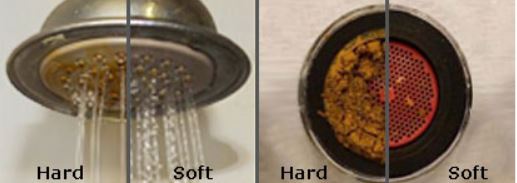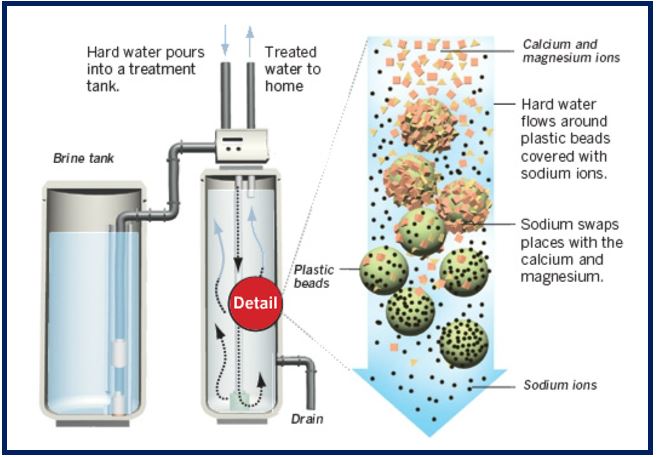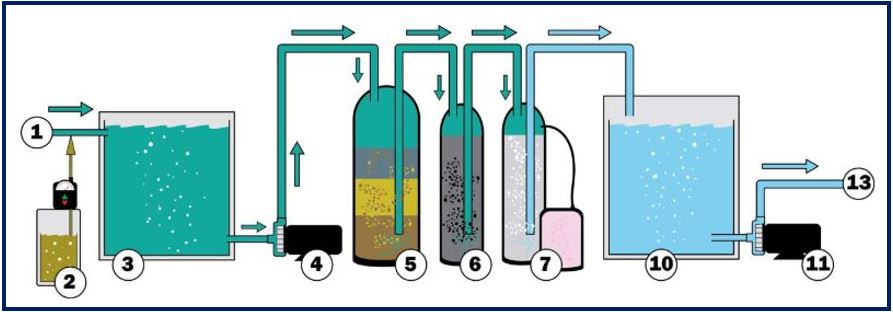If you’re like most people, you don’t really question the quality of your water as long as you know that it’s clean. A common misconception about water softeners is that they are luxury systems and not essential to every household. But we’re here to tell you everything you need to know about the best water softeners in 2020 – including the process, the different types and benefits, and why you should be investing in adding a them as an essential part of your home water filtration system.
The Difference Between Hard Water and Soft Water
 First, what is “hard water”? For some of you, it has never occured to you that there is a significant difference between the two. In simple terms, hard water refers to water that has high levels of calcium and magnesium which are not elements easily filtered out through normal filtration systems.
First, what is “hard water”? For some of you, it has never occured to you that there is a significant difference between the two. In simple terms, hard water refers to water that has high levels of calcium and magnesium which are not elements easily filtered out through normal filtration systems.
Now, what does this mean? For starters, in terms of consumption, high levels of calcium and magnesium can be very harmful to the human body. In terms of daily and general use, hard water can cause scaling and cause pipes to clog, which leads to more problems in the long run in terms of maintenance. Other inconveniences caused by hard water can be differences in appearance such as dull dishes, hard skin, dry hair- all of which can be attributed to the simple fact that soap has a more difficult time dissolving in hard water.
Water Softeners and the Water Softening Process
 Now that we have discussed the difference between hard water and soft water, here arises the question of: what is a water softener, and how does it work?
Now that we have discussed the difference between hard water and soft water, here arises the question of: what is a water softener, and how does it work?
Water softening is a natural process but in order to understand it, you need to understand basic science. The natural process that all water softeners use is called ion exchange. An ion is an atom with an electric charge.
Water becomes hard because of high levels of calcium and magnesium. Through ion exchange enacted by water softeners, hardening elements such as calcium, manganese, and even iron, are replaced with sodium ions- which have a much weaker electric charge, making the water soft, and trapping the harsh minerals in the water softener’s filtration system. The hard water passes through the filtration system where the medium, most commonly being resin beads, charged with sodium, clings onto the hard particles and releases sodium ions.
Essentially, a water softener works like a magnet to prevent minerals from entering the water supply and making the water hard. Ultimately, your decision to get a water softener will depend on your budget as well as water hardness level. You can reference Water Filter Spot’s list of the best water softeners for recommendations on what to get.
Types of Water Softeners: Salt Free vs Salt Based
Just like most water filtration systems, there are different types in order to accommodate for different lifestyle needs. In the case of water softeners there are traditional, salt based water filters and there are salt free filters.
Salt Free Water Softeners
Salt-free water softeners are best for whole-home use. Just like it sounds, salt-free water softeners do not add sodium to the water supply. This allows you to reap the full benefits of using a water softener such as brighter clothes, softer skin, and shiny dishes. Water without sodium is distinct for its silky feel, and is an extremely cost efficient option as salt-free water softeners do not need to be replaced or reloaded as often.
Salt Based Water Softeners
Salt-based water softeners also get the job done but are no longer recommended or intended for home use. These systems are better for heavy-duty use such as commercial or job sites.
Basic Parts of a Water Softener
 There are three basic parts to every water softener: the mineral tank, the control valve, and the brine tank.
There are three basic parts to every water softener: the mineral tank, the control valve, and the brine tank.
In simple terms, the mineral tank is where the water is softened, the control valve is for you to see the progress and status of your softener, and the brine tank holds the sodium and ions needed to aid the mineral tank in softening the water. The brine tank is especially important in understanding the regeneration cycle.
Regeneration Cycle: Co-current vs. Counter-current Regeneration
Since water softeners use a natural process, it requires regeneration. This happens one of two ways:
Co-current Regeneration
Co-current regeneration is the way of strengthening resin beads by allowing solution to be released from the brine tank in the same direction of the current flow of water, The brine passes through the resin and the hardness in the materials are pushed towards the resin beads.
Counter-current Regeneration
Unlike co-current regeneration, water enters the mineral tank from the bottom and works itself up. This process starts from the bottom and works its way up, and in the end uses less salt and water than co-current regeneration.
Benefits of Using a Water Softener
Now that the technicalities and features of water softeners have been discussed, we can now go on to discuss the benefits of a water softener and why you should use one. In short, using a water softener improves the quality of life in a modern home. Here are a few benefits of water softeners that you will be able to quickly observe:
- Dishes and utensils with more shine.
- Less soap and residue build up in the dishwasher.
- Softer hair and skin as a result of soft water from the shower.
- Softer and brighter clothes from the laundry.
- Less mineral build up in water pipes.
- Longer lasting water appliances.
- Allows water to heat up faster
- Less energy is used, causing monthly energy bills to go down.
Conclusion
To sum it all up, a water softener in the modern day home is essential to household water filtration. Ensuring that your water is soft enough for daily use is a huge part of self-care and proper wellbeing. We care about the quality of water going inside our bodies, and that same level of concern should be applied when it comes to the water we use externally on a daily basis. After going through the scientific process behind water softening, the different types and processes of water softeners, and the numerous benefits, it is clear that a water softener is a household essential.
________________________________________________________________
Interesting related article: “Selecting a water filtration system.”

